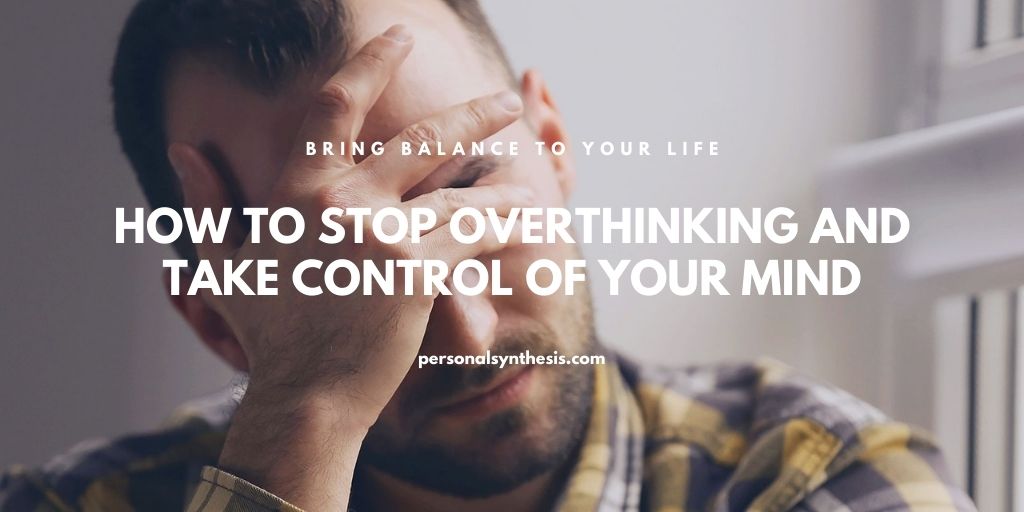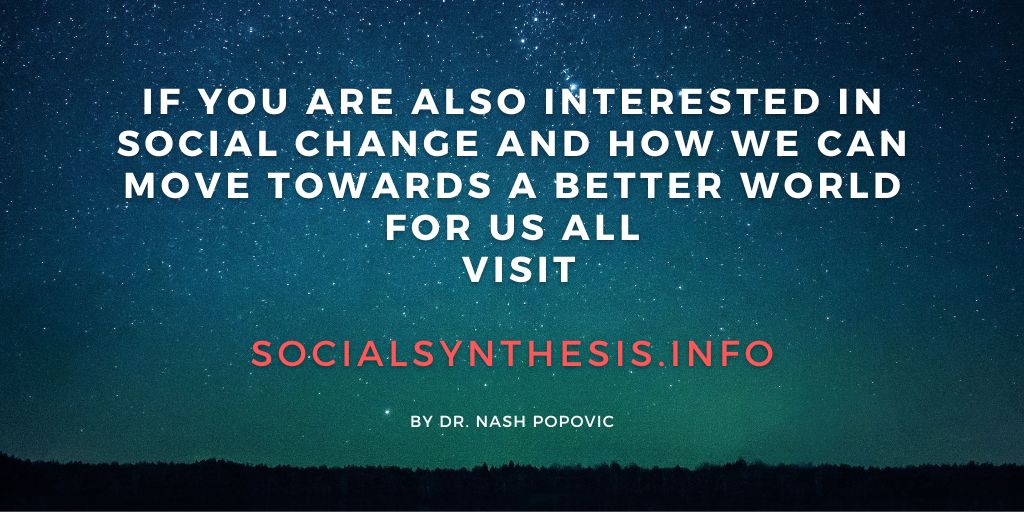How to Stop Overthinking and Take Control of Your Mind

Written by Slobodan Kezunovic
“The mind is a wonderful servant, but a terrible master.” – Robin Sharma
Overthinking important decisions or situations is something we all do from time to time, but for some of us it can go to such extremes that it can really start to mess our life up.
It can keep us up at night for hours, playing reruns of the same film over and over again in our mind, or visualizing the worst possible scenarios of things soon to come. The tendency to overthink everything can even lead us down a treacherous path of anxiety and depression.
It’s like redlining a car’s engine with the parking brake pulled while the front wheels just spin in place. You burn out with a lot of smoke, but it gets you nowhere.
Overthinking is essentially being trapped in our own heads, overanalysing every little detail of a situation until we’re so far gone that we’re unable to take any action. When it gets really bad, it becomes what is called “paralysis by analysis”.
The Two Faces of Overthinking
As you may have already gathered, overthinking usually involves two different, but equally harmful thought patterns.
The first is ruminating and dwelling on the past. Constant recycling of thoughts such as “I should have kept my mouth shut at lunch today. Now everyone thinks I’m a moron.”, “I wish I’d never left my hometown, I could’ve been so much happier there…”, “If only I had the guts to tell her how I really feel, everything could have been so much different…”
These are only some basic examples of rehashing the past that can plague our mind and throw us into an endless loop of “what ifs” and “could have beens”.
The other type of overthinking involves constant worrying about the future. It often tends to spiral out of control with catastrophic predictions of events that are yet to take place.
“I’ll never meet this deadline. I’m going to lose my job and become homeless!”, “I’ll just never be good enough. My wife is going to find someone way better than me and I will end up alone and miserable.”, “Tomorrow’s presentation is going to be a disaster and everyone will think I’m a fraud.”
This is just a glimpse of the possible doom and gloom scenarios we can come up with when we let our imagination run amok.
Overthinking is also one of the surest ways to suck all the joy out of life. It compels us to overanalyse situations that we might have simply enjoyed otherwise, if only we knew how to stop and smell the roses every once in a while.
On the one hand, deconstructing something positive into oblivion can only drive the happiness away, and even make us start seeing problems where they don’t even exist.
On the other hand, when we overthink actual problems, we make them seem bigger and way scarier than they really are. This can easily throw us into a vicious circle of avoidance that sinks us deeper into a quicksand of fear and despair.
So, what do you want first, the good news or the bad news?
No need to overthink this one, I’ll just give it to you straight.
The bad news is, the more you dwell on or worry about something, the more you train your mind to develop the habit of thinking about it.
The good news is, like most habits, it’s a habit that can be broken!
How Can We Break the Habit of Overthinking?
If you’re a chronic overthinker, you already know that shutting off your mind is far easier said than done. But regardless of how hard it may be, there are certain things we can do to quiet our mind and break the cycle of endless chatter inside our head.
Recognize When You Are Doing It
The first step in beating overthinking is to become aware and recognize when your thoughts are starting to spiral out of control.
When you catch yourself replaying the same event over and over again in your mind, or beginning to worry about things that you have absolutely no control over, hit the brakes for a second and acknowledge that the path you’re about to go down leads to nowhere.
A simple pause and acknowledgement can help you snap out of it and bring you back to earth before the tornado of thoughts carries you away.
Prepare for the Worst and Hope for the Best
In this age of social media, we are constantly bombarded from all sides with news and information, and at times it seems like the vast majority of it is negative. Whether we realize it or not, this affects our way of thinking and trains our mind to identify and focus on everything that is wrong in life.
The world is indeed full of troubles, but it is full of an equal, if not greater amount of beautiful and positive things as well.
Now, this doesn’t mean you should ignore the potential dangers of a given situation, or that you should disregard entirely the disabling factors when faced with a complex decision.
Prepare for what can go wrong, but then put the thinking about it to rest and turn your mind and energy towards what can go right.
Embracing the enabling factors and looking forward to a positive outcome will reduce your anxiety about the future and stop your mind from going into overdrive.
Look At the Big Picture
It’s easy to get carried away with minor details in life and miss the big picture. That’s why it’s important to always put things into perspective.
When we dwell on things for too long, they tend to appear bigger, scarier, and way more important than they might actually be.
Simply ask yourself, “Will this matter five years down the road?” You might be surprised when you realize it might not even matter a week from now.
Shifting your perspective to a different time frame can help reduce the apparent gravity of a given situation and nip your overthinking in the bud.
Keep It Simple
When we overthink a decision, we tend to add complexity onto complexity by considering way too many variables, often without filtering or weighing the actual importance of each one.
Once we have introduced more factors than it is possible to rationally handle, we tend to resort to abstractions that are then sure to detach us from any actionable reality.
Getting too abstract when pondering a decision will only waste your time, cloud your judgement, and increase the risk that you will make a poor decision.
Let Go of Perfection
Nothing will ever be perfect, and there is no reason that it has to be. There will never be a perfect moment to start a business, a perfect moment to ask your crush out, or a perfect moment to start exercising and getting in shape.
The same applies to us as well. Overthinking and striving for perfection is often rooted in a fear that we’re not good enough, that we don’t have the smarts or dedication to achieve something.
Accept your best and cut yourself some slack. Give your maximum effort whenever you can, but then accept that you’ve done all you could and that nobody is perfect.
Don’t Feed Your Fears
There is an old Native American story about two wolves that inhabit our souls. The two wolves are engaged in a never-ending battle and represent the internal conflicts we all experience throughout life.
One wolf represents evil, darkness, fear and despair. The other one represents joy, love, kindness, compassion, peace and serenity.
The eternal question is: Which wolf will come out victorious? The answer: It’s the one you feed.
The list is endless when we let our imagination loose with everything that could go wrong in life. But in all reality, most of the bad things we can imagine are probably not going to happen.
Set Aside a Certain Time to Let Your Thoughts Loose
Yes, you read that correctly. Designate a certain period of time you can spare during the day and let your thoughts off the chain. Take ten, fifteen or thirty minutes, and let ‘em rip!
Let your thoughts run wild and take you wherever they may. After the time you have set aside to go ballistic has run out, leave it at that and get on with your day.
It may seem counterintuitive and like you’re opening a Pandora’s Box that you won’t be able to close later, but this can be a good way to let off steam and get the overthinking out of your system, at least for the day.
Don’t Believe Everything You Think
One of the most important things when it comes to overthinking is to separate your thoughts from your beliefs.
We all have all sorts of thoughts during the day. They can come and go without much logic, often fuelled by our subconscious programming.
When it gets unhinged, our own mind will tell us lies, unleash barrages of negative self-talk and blow things out of proportion.
It’s important to be aware that our mind can play tricks on us, causing us to take disastrous views on a given situation which can be completely detached from reality.
Occupy Your Mind With Something Else
If you’re having a hard time letting go of certain thoughts, you can always try replacing them with different ones.
Taking up an immersive hobby that will occupy your mind is also a good alternative, as well as diving into some good ole physical work or exercise.
If exercise or physical labour are not your cup of tea, you can always just play some engaging music, or try practicing meditation and getting rid of your thoughts altogether.
Let Go of the Past
Analysing past events is not bad in and of itself, and it can be beneficial if it allows us to learn certain lessons that can help us in the future. But after a certain point, rehashing events over and over again just becomes a waste of both time and energy.
Allow yourself to draw whatever wisdom and experience you can from past events, and then let them go.
It’s also useful to bear in mind that just because something didn’t go right in the past, doesn’t mean that it can’t go right in the future.
Accept Uncertainty
Unless you’re Nostradamus reincarnated, there’s no way in the world you can predict the future. But you know what? That’s perfectly fine.
Uncertainty is what gives life its sense of wonder, mystery and adventure. It’s what gives true meaning to the words “anything is possible”.
Try to adopt a more adventurous attitude towards life and what may be waiting for you further down the road. It will help you develop courage and alleviate your fear of the unknown.
Be Solution Oriented
Ruminating about the past or obsessing about the future does nothing but separate us from the present moment. It renders us powerless to do what can and needs to be done right now.
When we get caught up in a spiral of overthinking, we tend to focus too much on analysing the problem itself instead of evaluating the possible solutions.
We often get stuck on trying to figure out why something has happened, instead of shifting our focus and energy onto what we can do about it.
So, instead of dissecting the problem until you have turned it into a pile of mental mush, take a piece of paper and make a list of all the possible solutions.
Writing down potential solutions will help you formulate them better and then allow you to choose the best one, while at the same time preventing your mind from flying all over the place.
Take Action
Last but not least, take action! Don’t let little problems stack up on top of each other until you’re surrounded by a wall, instead of stepping over each individual brick as it came along.
Slay the dragon while it’s small, before it grows into a fire breathing monster.
Even if you’re unable to take massive action in one stride, remember that even the smallest step in the right direction will move you closer to your goal.
If you want to learn more about your thoughts and relating to yourself, subscribe to the full Personal Synthesis programme to help you improve in this and many other areas of your life.
Personal Synthesis is a handy ‘one-stop-shop’ that brings together all the areas that play a vital role in our everyday lives, from self-awareness to intimate relationships. The materials are the result of twenty years of research and have evolved through the experience of running numerous personal development programmes with the general public, young people and university students.
To learn more, please visit the Personal Synthesis materials that cover this and many other topics.
Slobodan Kezunovic
Slobodan Kezunovic has an academic background in business management and marketing, but has been a lifelong student of personal development and a promoter of dealing with life’s challenges in a healthy and constructive way. Psychology and human relations have always fascinated him and have been a key driver on his own road to personal development, believing that the only way you can change the world is by changing yourself. Slobodan works as a copywriter and editor with over 7 years of experience writing sales copy and marketing content for several industries. He has been following Dr Nash Popovic’s work closely and collaborates with him as a contributor to the Personal Synthesis project, with the goal of helping people live a more prosperous and skilful life.



